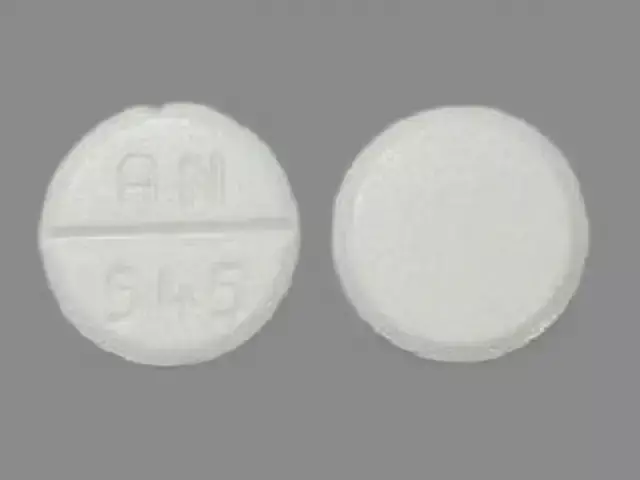- Author Rachel Wainwright [email protected].
- Public 2023-12-15 07:39.
- Last modified 2025-11-02 20:14.
Zincet
Zinzet: instructions for use and reviews
- 1. Release form and composition
- 2. Pharmacological properties
- 3. Indications for use
- 4. Contraindications
- 5. Method of application and dosage
- 6. Side effects
- 7. Overdose
- 8. Special instructions
- 9. Application during pregnancy and lactation
- 10. Use in childhood
- 11. In case of impaired renal function
- 12. For violations of liver function
- 13. Use in the elderly
- 14. Drug interactions
- 15. Analogs
- 16. Terms and conditions of storage
- 17. Terms of dispensing from pharmacies
- 18. Reviews
- 19. Price in pharmacies
Latin name: Zyncet
ATX code: R06AE07
Active ingredient: cetirizine (Cetirizine)
Manufacturer: UNICHEM LABORATORIES, Ltd. (UNICEM LABORATORIES Ltd.) (India)
Description and photo update: 2020-22-07
Prices in pharmacies: from 107 rubles.
Buy

Zincet is an anti-allergic agent.
Release form and composition
Dosage forms of the drug:
- film-coated tablets: oblong, convex on both sides, white, with a risk on one side (in a cardboard box, instructions for the use of Zintset and 1 blister containing 10 tablets);
- syrup: slightly viscous, colorless or light yellow transparent liquid (in a cardboard box, instructions for medical use of the drug and 1 dark glass bottle containing 60 ml of syrup, complete with a measuring cup).
Composition of 1 tablet:
- active substance: cetirizine hydrochloride - 10 mg;
- auxiliary components: titanium dioxide, isopropyl alcohol, povidone, lactose, purified talc, dichloromethane, eudragit, magnesium stearate, acetone, macrogol 6000, corn starch, purified water.
Composition of 5 ml syrup:
- active substance: cetirizine hydrochloride - 5 mg;
- auxiliary components: purified water, anhydrous sodium salt of acetic acid, propyl hydroxybenzoate, sucrose, glacial acetic acid, methyl hydroxybenzoate, glycerin, Banana flavoring additive.
Pharmacological properties
Pharmacodynamics
The active ingredient in Zinset is cetirizine, an effective antihistamine, an antiallergic agent from the group of competitive histamine antagonists, selectively blocking H 1 -histamine receptors.
The drug acts on the histamine-dependent stage of the allergic reaction. Reduces the migration of basophils, eosinophils and neutrophils. At the cellular stage of the allergic reaction, it inhibits the release of inflammatory mediators. The preliminary intake of the drug allows you to prevent the development of allergies. When a reaction occurs, Zintset facilitates its course, including reducing itching.
Cetirizine has practically no antiserotonin and anticholinergic effects. In the range of therapeutic doses, it has almost no sedative effect.
An important advantage of the drug is the lack of tolerance during the course of treatment.
The effect of Zintset develops within 1-2 hours after administration, the duration of the blockade of H 1 -histamine receptors is more than 24 hours. The effect of the course therapy lasts for 1-3 days after stopping the drug intake.
Pharmacokinetics
After oral administration, cetirizine is rapidly absorbed. The absorption rate is at least 70%. After applying a dose of 10 mg, the maximum concentration (C max) in plasma is reached within 1 hour and is 0.3 μg / ml. With the simultaneous intake of food, the degree of absorption does not change, but the absorption time increases by 1 hour.
A stable plasma concentration is achieved approximately 3 days after the start of treatment. With repeated administration of Zinset, the content of cetirizine in the blood serum and in the skin is approximately the same. In the brain, the C max of cetirizine is up to 10% of the C max in plasma.
About 93% of the drug binds to plasma proteins. The volume of distribution is 0.56 l / kg. The systemic clearance is 54 ml / min. Penetrates into breast milk.
It undergoes minimal metabolism in the liver, as a result of which an inactive metabolite is formed. It is excreted from the body unchanged, mainly by the kidneys. On the first day after administration, 60% of the drug is excreted in the urine, 10% in the feces. The half-life (T 1/2) in children is on average 6 hours, in adults - 7-11 hours, in elderly patients T 1/2 is lengthened.
In persons with functional impairment of the kidneys [creatinine clearance (CC) 11-31 ml / min] or who are on hemodialysis (CC <7 ml / min), the systemic clearance decreases by 70%, and T 1/2 increases by 3 times. In elderly patients and people with chronic liver diseases, the systemic clearance decreases by 40%, and T 1/2 increases by 2 times.
Taking a dose of 10 mg daily for 10 days was not accompanied by the accumulation of the drug in the body.
Indications for use
Zincet is used for the symptomatic treatment of the following diseases:
- idiopathic urticaria;
- hay fever (hay fever);
- seasonal / perennial conjunctivitis / allergic rhinitis;
- allergic dermatoses, accompanied by skin rashes and itching.
Contraindications
Absolute:
- end stage renal failure (CC <10 ml / min);
- fructose intolerance, sucrase / isomaltase deficiency, glucose-galactose malabsorption (for syrup);
- children's age - up to 2 years (for syrup), up to 6 years (for tablets);
- period of pregnancy and lactation;
- hypersensitivity to hydroxyzine, any component of tablets or syrup.
Relative (Allergy tweezers should be used with caution):
- impaired renal function;
- functional disorders of the liver;
- elderly age.
Zintzet, instructions for use: method and dosage
Syrup and Zinsett tablets are taken orally. The coated tablets should be swallowed whole with sufficient water. Meal time does not matter.
Recommended dosage regimen depending on the patient's age:
- children from 2 to 6 years old: 5 mg (1 teaspoon of syrup) 1 time per day or 2.5 mg (½ teaspoon of syrup) 2 times a day, morning and evening;
- children from 6 to 12 years old: 10 mg (2 tsp syrup or 1 tablet) 1 time per day or 5 mg (1 tsp syrup or ½ tablet) 2 times a day, morning and evening;
- adolescents over 12 years old and adults: 10 mg (2 tsp syrup or 1 tablet) 1 time per day.
For elderly people, patients with severe functional disorders of the kidneys / liver, the doctor selects the optimal dose of Zinset individually, but it is always lower than the usual therapeutic dose.
You cannot increase the recommended dose on your own. If the next appointment was missed, you should take the drug as soon as possible, only if the time for the next appointment is not approaching. Otherwise, the Zincet should be taken as usual, avoiding a double dose.
Side effects
The adverse reactions of the drug described below by the frequency of development are divided in accordance with the classification of the World Health Organization: very often - more than 1/10 of cases; often - from> 1/100 to 1/1000 to 1/10 000 to <1/1000; very rarely - <1/10 000, including individual cases.
The forceps can cause the following side effects:
- from the nervous system and sensory organs: often - dizziness, drowsiness, anxiety, fatigue, headache, agitation, nervousness; infrequently - insomnia, euphoria, impaired thinking and concentration, confusion, depression; rarely - impaired sense of smell and coordination of movements, conjunctivitis, xerophthalmia, eye pain, impaired accommodation and vision, hemorrhage in the eye, glaucoma, ptosis, calf muscle cramps, tremor, paresthesia, hyperkinesis, ataxia, depersonalization, amnesia, dysphonia, myelitis tinnitus, ototoxicity, deafness, paralysis;
- from the respiratory system: rarely - nasal polyp, rhinitis, sinusitis, dyspnoea, pharyngitis, nosebleeds, increased bronchial secretion, cough, upper respiratory tract infection, bronchospasm, bronchitis, hyperventilation, pneumonia;
- from the organs of the gastrointestinal tract: infrequently - a change in taste, flatulence, dry mouth, diarrhea, abdominal pain, increased appetite, lack of taste, anorexia; rarely - thirst, discoloration of the tongue, increased caries, increased salivation, stomatitis (including ulcerative), swelling of the tongue, constipation, dyspepsia, melena, gastritis, hemorrhoids, vomiting, liver dysfunction, rectal bleeding;
- on the part of the cardiovascular system: migraine; very rarely - hypertension, palpitations, heart failure;
- on the part of the skin and subcutaneous fat: increased sweating, photosensitivity, rash, acne, blister eruptions, dermatitis, erythema, eczema, furunculosis, dry skin, hyperkeratosis, itching, seborrhea, alopecia, hypertrichosis, angioedema;
- from the genitourinary system: cystitis, urinary retention, edema, urinary tract infection, dysuria, polyuria, hematuria, vaginitis, intermenstrual bleeding, dysmenorrhea, menorrhagia, weakening of libido;
- from the musculoskeletal system: muscle weakness, back pain, myalgia, arthritis, arthrosis, arthralgia;
- others: weight gain, chills, fever, malaise, dehydration, lymphadenopathy, hot flashes, pain in the mammary glands, diabetes mellitus.
Overdose
A single dose of more than 50 mg of cetirizine can cause the following symptoms: sedation, drowsiness, weakness, tachycardia, fatigue, headache, confusion, malaise, dizziness, stupor, tremor, mydriasis, urinary retention, itching, diarrhea.
In case of taking an excessive dose of Zintzet, you should rinse the stomach or provoke vomiting on your own and take activated charcoal. The specific antidote has not been established. Overdose treatment is symptomatic and supportive. Hemodialysis is ineffective.
special instructions
Patients should be warned that during the period of treatment with Zinset, the simultaneous administration of other drugs that are not agreed with the doctor should be avoided.
It is not recommended to take alcohol and drugs that have a depressing effect on the central nervous system (CNS) together with cetirizine.
Influence on the ability to drive vehicles and complex mechanisms
When taking Zintset in the doses recommended by the instructions, there was no negative effect of the drug on the reaction rate and the ability to concentrate. Nevertheless, it has been established that cetirizine can cause drowsiness, dizziness and some other potentially dangerous symptoms, therefore, during the period of treatment, all patients are advised to refrain from activities that require quick reactions or increased attention.
Application during pregnancy and lactation
Allergy forceps are contraindicated during pregnancy and lactation.
Pediatric use
Coated tablets Zinset are not prescribed for children under 6 years old, syrup - up to 2 years.
With impaired renal function
The forceps are contraindicated in patients with end-stage renal disease.
In case of impaired renal function, it is used with caution, in a reduced dose.
For violations of liver function
Patients with functional impairment of the liver should be treated with precautions. The dose of Zintzet must be reduced.
Use in the elderly
In the elderly, Zincet should be used with caution.
Drug interactions
Zintzet should not be combined with drugs that depress the central nervous system, as well as drugs containing ethanol.
When theophylline is taken together, the incidence of side effects increases.
It is recommended that you check with your doctor for any other drug.
Analogs
Analogs of Zintset are Acristil, Allegra, Blogir-3, Glenzet, Desloratadin, Diphenhydramine, Zodak, Zyrtec, Claridol, Kestin, Lomilan, Loratavel, Nixar, Nalorius, Pipolfen, Parlazin, Suprilamin, Solonex, Telfeksin, Feksin, Tofax, Chloropyramine, Cetrin, Cetirinax, Cetirizine, Erius, Elisey, Ezlor, etc.
Terms and conditions of storage
Store at temperatures up to 30 ° C in a dry place out of reach of children.
Shelf life of syrup is 2 years, tablets - 3 years.
Terms of dispensing from pharmacies
Available without a prescription.
Reviews of Zinset
There are no online reviews about Zinset. However, there are many reports of other preparations containing a similar active ingredient. According to most users, cetirizine helps well with allergic diseases, quickly relieves the developing symptoms of allergies, and is well tolerated. The tablets are sold in almost all pharmacies and are inexpensive.
Zintzet price in pharmacies
The price of a Zintset in the form of film-coated tablets, 10 mg, is approximately 106-122 rubles. per pack of 10 The cost of the syrup is currently unknown due to its lack in free sale.
Zintzet: prices in online pharmacies
|
Drug name Price Pharmacy |
|
Zintzet 10 mg film-coated tablets 10 pcs. 107 RUB Buy |
|
Zincet tablets p.o. 10mg 10 pcs. 114 RUB Buy |

Anna Kozlova Medical journalist About the author
Education: Rostov State Medical University, specialty "General Medicine".
Information about the drug is generalized, provided for informational purposes only and does not replace the official instructions. Self-medication is hazardous to health!






